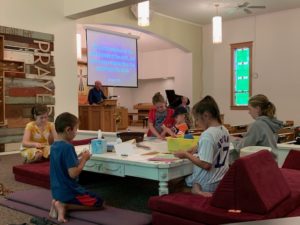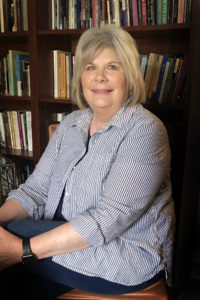Join Us Sunday Mornings

10 A.M. Worship

Teaching & Preachings
Genesis 1:26 says;
Then God said, “Let us make man in our image, after our likeness. And let them have dominion over the fish of the sea and over the birds of the heavens and over the livestock and over all the earth and over every creeping thing that creeps on the earth.”
Recent Devotionals
March 2021
Recent Posts

The Easter Thoughts of Mary Magdalene

(Several years ago, I used this reading as part of an Easter Sunrise service. It spoke deeply to me then. It seemed I had much more in common with Mary Magdalene than I thought! This week, the first week of the Easter season, I pulled it back out, and it spoke to me again … but in a completely different and new way. Isn’t that how God works! Perhaps it will speak to you too. ~ Pastor Bob)
I have heard the words with my own ears, yet I cannot believe it. I must take a few minutes to compose myself before I run to tell the disciples what I have seen and heard. For they will surely think that I am mad — again. They will not believe me. Why should they believe me? I do not even believe myself, all that I have heard and seen this day.
Perhaps the demons have come back! People say that I was possessed by seven demons. Those are dark times, cloudy times for me. I was so miserable. I know that sometimes my whole body revealed the anguish my mind was going through. That is when I first heard of this wandering Rabbi called Jesus. They said he had the power to heal, but I had little faith or hope that anyone could help me. I was too depressed to have much hope in anything then. But the other women of Magdala were going to see him, so I thought I’d go too. Perhaps some small part of me was still able to hope.
We went to a hillside outside of Magdala and waited for him to join us. He appeared, surrounded by his 12 chosen, and then he climbed to the top of the hill and began to speak. It was a huge crowd, but everything got quiet when he spoke. Everyone listened to him. Even though I had not been able to keep my concentration for longer than 5 minutes for years, I found myself suddenly calm inside.
I don’t quite know how he knew me – whether someone had told him or whether he just saw the pained, crazy look on my face, but he came over and knelt down beside me. I remember I began to tremble, just as I am trembling now. But he looked into my eyes and he called me by name, just as He did today. I don’t know how, but He knew my name. He said, “Mary, Mary, be free of your demons.”
And then, He looked at me with so much love. How could he love me, a stranger? My own family found me unlovable. I found myself unlovable most of the time. But there He stood, and the love shone in his eyes, and tears welled up in mine. Could I love myself as He was loving me? Could I trust myself as he was trusting me?
“You are precious; you are whole” he said to me, and I will never forget that moment as long as I live. That was the moment I knew he was the Messiah we had been praying and hoping for. His look of love changed everything for me. I felt whole for the first time in my life, though the demons of fear and anxiety and self-doubt still come back to haunt me and tempt me like they are doing now.
I committed my life to Him at that moment. I packed up and left home to follow Him. My family didn’t understand. They said I was still crazy. Men could wander around with a traveling rabbi, men could spend their time learning and speaking of the reign of God, but if a woman did it, she was crazy, possessed. But, I went anyway and I was not the only one. If I was crazy, so were Suzanna and Joanna and many other women.
And Jesus did not send us away, he never told us to go home and be quiet. He welcomed us and taught us many things about the Kingdom of God and about what would be required of us. And then he died.
There was still so much more I wanted to learn, so much more he had to do. How could they do that? How could our priests, our holy men, persecute him? I followed after them that night, hysterical, feeling more out of control than I had since I met him. They paraded him from one court to another until they finally got what they wanted – his crucifixion. And his friends, his noble 12, they were nowhere to be found. Oh, Peter followed for a while, but when he was afraid that they might turn on him, he too disappeared.
After they beat him and humiliated him, they nailed our Jesus to the cross and I was there – all the women were still there at the foot of the cross, following him even unto death. It seemed like forever that he hung there, suffering silently. The others were yelling and cursing, but all his thoughts were for us: He told John to take care of his mother. He asked God to forgive those who had killed him, “Father forgive them” He said, “for they know not what they do.” And they say I am crazy!
But my grief did make me crazy, then. It was terrible, overwhelming. And even though it has been three days ago, the pain has not subsided; the tears come from an unending spring. I can’t believe that he’s dead. I can’t believe they would crucify someone so loving and gentle as if he were a common criminal. I can’t believe that I am alone again.
Or am I?
Did I really see an empty tomb? Were there really 2 angels sitting in his place? Or was it all a dream, a fantasy born of grief. Was that really him who spoke to me? How could I think he was the gardener until I heard his voice? Why would my eyes not recognize my Lord? What if that was really him? What if I was not dreaming some strange daydream? Could it really be true? Could he be alive again?
Oh, no, my mind is still so confused, so overwhelmed. No one will believe me, not me, certainly not me. They will think this is all grief causing me to again go crazy. But he was there. I know in my heart it was Jesus. He spoke in that same kind, gentle voice that soothed me so long ago.
He has risen! Praise be to God – he is the Messiah. I am not alone, and I will never be alone again. My grief has turned to ecstasy; a sign of madness they will surely tell me. But I know what I saw.
Indeed, he has risen, and he has told me to go and tell the disciples. Oh Jesus, why me? Why are you sending me? Why have you singled me out from all the others? Is it just because in my grief I could not stay away from your grave? Is it just coincidence? No. You have chosen me, Master. I feel your call deep within me. I know even now that you want me to go, to flee immediately to the 12 and tell them what I have seen and what I have heard.
But I can’t. I am not the one to speak. Why would anyone believe me, a woman? Why would anyone believe me, a person with my reputation and my illness – cured or not? The men will never believe me. They will ridicule me and humiliate me. Peter and John were here, they saw nothing. They will not believe that Jesus has appeared to me, and commissioned me to proclaim his resurrection. I am afraid.
What am I going to do?
Dear Jesus, I look at your empty tomb and I know I cannot keep this secret to myself. You have come back to show us that you have conquered death and that you will never leave us again. This message is for everyone. I must tell someone. I must tell everyone.
After the way you have suffered these last three days, whatever they do to me will be a small price to pay. And there will be others who will believe. They will see this empty tomb and remember all your promises and their grief too will turn to ecstasy.
I serve a Risen Savior! And if I am mad, it is a glorious madness. A madness that will last through all eternity.
I go now, Jesus, to spread the news. I go…
Read more

DENYING JESUS

In the week before the very first “Easter,” the disciple known as Peter revealed the true intentions of his heart to the man that he left everything for. In the Gospel of John, as Jesus is just beginning a three-chapter sermon with his 12 disciples on what’s going to happen to Him as the week goes on, and why (see John 14, 15 & 16), Peter finds the truth too hard to believe.
It’s at the end of Chapter 13 of John when Jesus tells the disciples he will be leaving soon (John 13:33), and more importantly, he says, “where I am going you cannot come.” It must have been startling to those 12 men who had been following Jesus for 3 years or so to then hear Him say that they cannot follow Him anymore. As a consolation, sort of, Jesus tells them “but you will follow later.” (John 13:36)
I’m not so sure if that appeased any of the disciples, but we can be sure that it didn’t satisfy Peter. Peter ranted, somewhat like a 6-year-old might, telling Jesus in response, “Lord, why can’t I follow you now?” And then, in the emotional state he found himself in at the time, he blurted out how he really felt about Jesus. “I will lay down my life for you.”
I’m absolutely sure that’s what Peter wanted to believe about himself. He, of all the disciples, would be the one to openly announce that to Jesus’s face. But it wasn’t the truth; and Jesus knew it wasn’t the truth. At least not yet. In that moment, it was wishful thinking, at best. Peter wished he was the one disciple, at that time, who could prove his love and dedication to Jesus was beyond question. I can see how Jesus, in that moment, loved him just for that desire.
But Jesus also questioned Peter. “Will you really lay down your life for me?” Can you imagine, Jesus calling to you by name, and asking you to your face, “Will you really lay down your life for me?” My hunch is we would say exactly what Peter said. Of course, Lord Jesus, I am ready and willing to die for you right now!” But, would we mean it?
If so, let’s be clear about this life you say you would be willing to give away for Jesus. The truth is, Jesus is not asking you for just your physical life. He is asking for much more than that; your eternal life. The whole enchilada! Not just your earthly existence while spending time on earth, but the whole kit and caboodle. What Jesus is really asking for is that your spirit and soul belong to Him, by allowing him to take residence in your heart.
Now, if you do that, you may find yourself one day in a position of having to give your physical life for Jesus, but that is not His point. The eternal spirited self that God placed within you at creation is the very “life” that Jesus wants.
When you hear things like: Jesus gave His life for you and you should do the same for him; Jesus says we must die to our self first, and then be born anew; and, Jesus teaches that a true friend is one willing to lay down his life for another, it’s imperative to understand what “life” means for Jesus. Life, for Him, is not limited to human life on earth, but is infinite and eternal in His Father’s presence.
Well, I think you already know Jesus’s response as to whether Peter is serious about giving his life for him. He prophesizes to Peter, saying “Very truly I tell you, before the rooster crows, you will disown me three times.” (John 13:38) Hint: whenever Jesus says, “Very truly,” it’s always the truth. Bigger Hint: whenever Jesus speaks, it’s always the truth!
Soon after, Peter fulfills the prophecy and denies Jesus three times before morning comes. He says things like: I don’t know who he is; and I’ve never been with him; and I am NOT one of his disciples.
Wow! That seemed pretty easy, didn’t it? From full “willing to die for you” commitment, to complete and total denial in a matter of hours. I bet we can imagine just how easy that would be!
BUT … that was Peter before Easter. That was during a time when the disciples, including Peter, were still coming to an understanding of who Jesus really was. A rabbi? A king? A “messiah? Actually, yes … all those things. But one thing much more important. Jesus was God with us … Emmanuel. Peter and the disciples had not yet grasped the full understanding of what that truth meant.
And … neither have we. To do that, takes a lifetime, and beyond. But we can begin anytime. Especially, this Sunday … the 2,021st Easter. You see, Easter is about encountering the true Spirit of the living God, a gift that came to us directly from Jesus the Son. All of it … God.
On Easter morning, Peter runs to the tomb of Jesus and finds it empty. I’m sure he realized in that moment, that a rabbi, or a king, or a “messiah” cannot rise from the dead and walk out of a tomb. But God can. Oh My God! Jesus is God!
After that encounter with the empty tomb, and then the direct encounters with the risen Christ, Peter had finally fulfilled his wish. Indeed, Peter would give the rest of his life to Jesus, serving Him for the rest of his earthly life.
Never again would Peter deny Jesus. He never again said “I don’t know Jesus.” He never again claimed he had never been with Jesus. And he never again denied that he was one of the disciples of Jesus. His life was changed forever, and he accomplished his goal of giving his life away for Jesus by living it for Jesus!
Could this be the Easter that you make the same leap that Peter made at the first Easter? We all have good intentions. But Easter is about a lot more than good intentions, as Peter found out.
So, what about you? The life that Jesus wants from you is the very same life that God gave to you. Jesus was there when you were created, and He will be there when you leave here. But it’s your life on earth that matters most to God today, because that’s the life when you get to choose. So, I ask you: Do you know who Jesus really is? Do you want or claim to be His disciple? Do you never want to be without Him? If so … tell Him on Sunday. Then your Easter could be just as life-changing as Peter’s first Easter was for him. It’s for you to choose.
Happy Easter to All!
<>< Pastor Bob
Read more

LENT: ANOTHER VOICE

“Another Voice” this week features an article written in 2007 by Stephanie Paulsell. Stephanie is not just an academic star who wrote this powerful article while at Harvard Divinity School, and she’s not just one of the premier contemporary scholars offering her expertise to the major theological questions of the day, and she’s not just a lifelong student of the ways of monasticism and frequent guest at several abbeys. But Stephanie is also the daughter of one of my earliest and most important spiritual mentors in my journey, William Paulsell. Stephanie comes from a strong spiritual lineage, that she gets from both her mom and dad.
This article has a whole lot to say to each one of us … and to our church. You see, I think there’s something very spirited about smallness and closeness. I think the Holy Spirit soars in small places and among close friends. I think small and close aligns well with ‘The Way” of Jesus, and I think small and close is our secret weapon here at Vine Street. Too understand more, please read on …
On the Road to Jerusalem, with You …
Pastor Bob <><
A small, beautiful thing: Making a difference; changing the world
by Stephanie Paulsell
Years ago, when I had just begun teaching and wondered what kind of contribution I might make to the great world of scholarship, I spoke with a teacher and scholar whose work I very much admired. She had translated neglected works by medieval woman writers, written important articles on medieval women’s religious lives, and made influential contributions to the theory and practice of teaching history. What she had not done was write “the big book,” the monograph that laid out her theory of everything. I asked her if she planned to write such a book. “Oh,” she replied, “I prefer to do the small, beautiful thing.”
I’ve never forgotten her way of describing the kind of scholarship to which she is drawn: the small, beautiful thing. It is a good description of her work: every idea pursued down to the ground, every story told richly and every sentence polished until it glows. The small, beautiful thing has been the doorway through which she has felt herself invited into large, broad places where she could think her best thoughts and do her best work.
“You have set my feet in a broad place,” the psalmist sings in Psalm 31. Isn’t this what we all long for? A broad place in which to stand and stretch and look about us, a vantage point from which to make the best choices about how to spend our life’s energies? A place with room for our engagement with God, the world and one another to take root and grow?
It’s what I want. But too often I find myself stuck in narrow places, unable to imagine a way out. Psalm 31 names some of the nets that trap us: shame, entanglement, misplaced trust, affliction. But sometimes getting stuck is as simple as feeling that setting our feet in an increasingly narrow groove is the only way to get from one end of our commitments to another.
God longs to draw us from narrow places into more spacious ones. “God speaks,” the psalmist says, “and summons the earth from the rising of the sun to its setting.” Coming as it does in every moment of every day, God’s call is present not only in extraordinary moments, but also in the ordinary negotiations of our life in community. Our most mundane Lenten renunciations—a daily commitment to prayer, a daily commitment to be present to every person we encounter—are small, beautiful things that lift us from the groove of anxiety and busyness, production and achievement, and reorient us to the gift of our life.
- S. Lewis begins his autobiography with a story of a small, beautiful thing. When he was a little boy, his brother, Warren, brought him a tiny garden he had created in the lid of a biscuit tin. “As long as I live,” Lewis writes, “my imagination of Paradise will retain something of my brother’s toy garden.”
At its best, the life of faith gives an account of some small bit of the world—a bit of moss and twig and flower, a little bread, a little wine—and returns it to us as something larger, broader, more spacious. Religious traditions are full of stories in which something small repays practices of loving attention by cracking the world wide open. C. S. Lewis’s brother creates a toy garden in which his brother sees paradise.
I have noticed, however, that some of my students shift uncomfortably in their seats when I talk about this. They are in school to learn how to change the world. When I say small, they hear irrelevant, ineffectual. When I say beautiful, they hear decorative. A middle-class consolation, like Tivo or a trip to the beach.
During Lent I feel those worries too. What are these Lenten sacrifices for, anyway? Who cherishes these small renunciations? Surely God has bigger fish to fry in this world. Does God really care, or even notice, if I give up that glass of wine, that cup of coffee, that piece of cake?
But the small gestures that we are invited to embrace each Lent help us experiment with our lives; they help us try on different ways of living. Last year, a nine-year-old friend of my daughter told her, “I’m giving up sarcasm for Lent. And it’s really hard.”
So, her Lenten practice taught her what it feels like to have that sarcastic reply come to mind, and then to wait and let it pass. Perhaps she learned that to say no to a sarcastic remark opens a space for other kinds of conversation. Perhaps she learned to cherish the anticipation of what might be said instead. And perhaps, through her learning to say no to a small, destructive force, her ability to resist larger destructive forces increased.
The poet, C. D. Wright, in Cooling Time: An American Poetry Vigil, writes, “Everything has its meaning, / every thing matters; no one is a means – every one is an end.” If everything and every person matters, then the small, beautiful thing is never decorative, never icing on the cake. It is the thing itself. It makes a difference. It changes the world.
Read more
Meet Some Of Our Team


Send us a Message
Contact Info

 Subscribe to sermon Podcast RSS
Subscribe to sermon Podcast RSS Subscribe to iTunes podcast
Subscribe to iTunes podcast


